Functional Materials
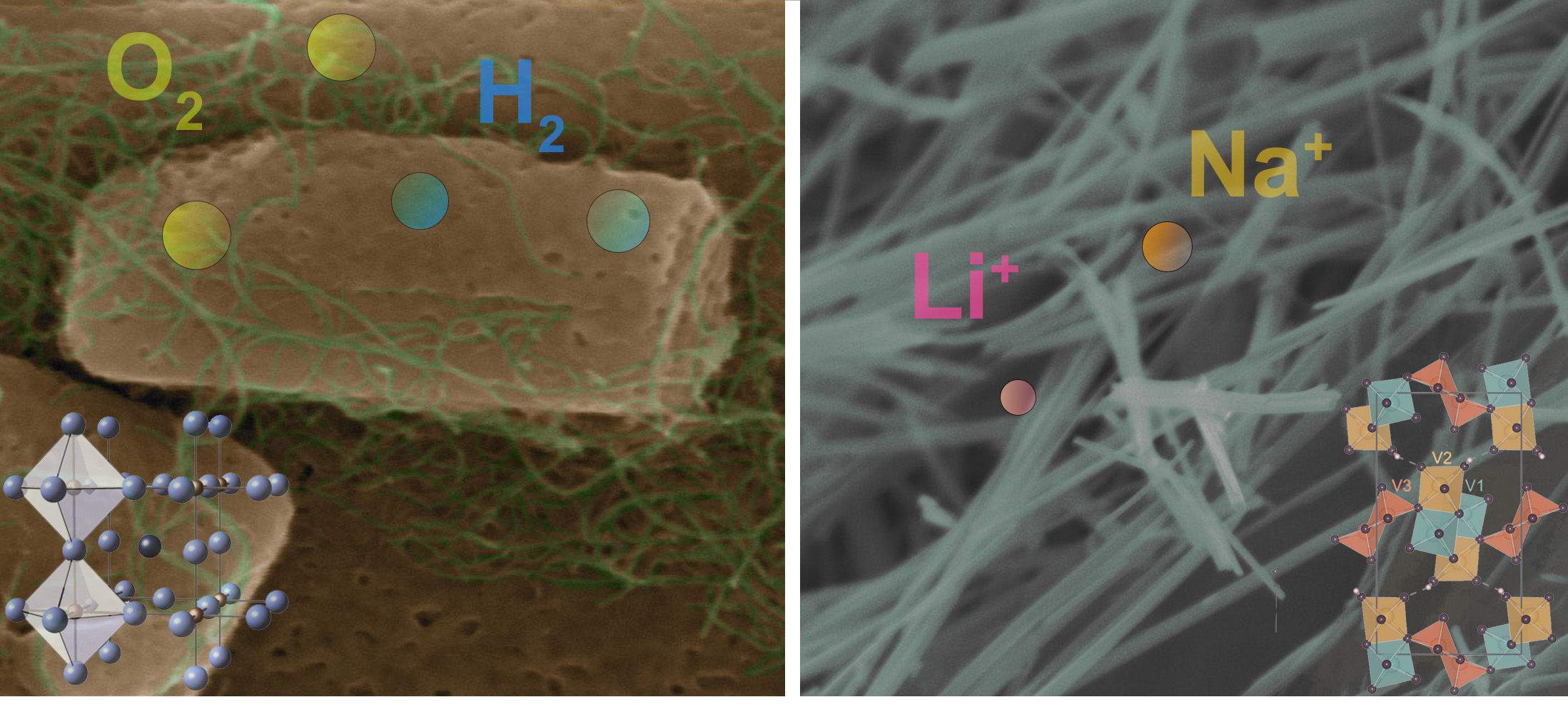
Renewable energy conversion and storage are relevant topics in applied research today, since the use of non-fossil energy sources is essential for the reduction of CO2 emissions. Solar and wind energy harvesting combined with chemical energy storage in batteries or fuels like hydrogen are essential processes, which need to be improved in efficiency, long-term stability and scalability. Our goal is to contribute to the development of cost effective scalable solutions for energy conversion and storage.
Recent news
TEM Workshop: „Exploring Structures at the Atomic Scale – New Possibilities in Transmission Electron Microscopy at PLUS“
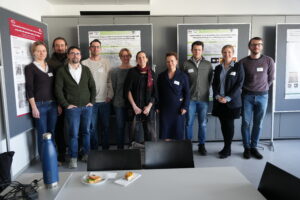
Organizing commitee and invited speakers of PLUS TEM Workshop
February 7, 2025, Salzburg
Program and registration
Oral presentation: „Degradation of LaTiO2N based photoanodes“
J. Hörndl
Materials for Sustainable Development Conference (MATSUS Fall 24), November 12 – 15, 2024, Lausanne, Switzerland
Oral presentation: „Photocatalytic Performance Improvement of BiVO4 via Cl– Doping“
J. Praxmair
Materials for Sustainable Development Conference (MATSUS Fall 24), November 12 – 15, 2024, Lausanne, Switzerland
Poster presentation: „Vanadium-based cathodes for sustainable aqueous Na-ion batteries“
J. Lam Chen, D. Söllinger, S. Pokrant
European Materials Research Society 2024 Fall Meeting, September 16 – September 19, 2024, Warsaw, Poland
Poster presentation: „TEM structural analysis of photocatalytically active mesoporoussingle-crystalline LaTiO2N particles“
J. Zalesak, J. Praxmair, J. Hörndl, S. Pokrant
European Microscopy Congress 2024, August 25 – August 30, 2024, Copenhagen, Denmark
Talk: „Hydrated Vanadium oxide – a Promising Cathode Material for Lithium-Ion and Sodium-Ion Batteries“
D. Söllinger, S. Pokrant
Exner Lectures 2024, May 14, 2024, Vienna, Austria
Further information: https://wilhelmexner.og/2024/exner-lectures-2024/
Talk: „Comparing the Insertion Properties of Mg2+ into V3O7.H2O in Organic and Aqueous Electrolytes“
D. Söllinger, S. Pokrant
Materials Research Society – Spring Meeting 2024, April 22 – April 26, 2024, Seattle, Washington, USA
Further information: https://www.mrs.org/meetings-events/spring-meetings-exhibits/2024-mrs-spring-meeting
Oral presentation: „Porous Boron Nitride as Scaffold for Silicon Composite Anodes“
M. Karl
MRS Spring Meeting 2024, April 22-26, Seattle, USA
Keynote Lecture by Simone Pokrant at the 14th ASEM workshop 2024: „Beam sensitive samples in material science and the link to TEM in biological sciences“
14th ASEM Workshop 2024, „Advanced Electron Microscopy“, April 4-5, 2024, Graz, Austria
Invited Talk: „Strategies for the Morphological Design of Photoactive Oxynitride Particles and Electrodes for Solar Water-splitting“
S. Pokrant
87. Jahrestagung der DPG und DPG-Frühjahrstagung 2024 der Sektion Kondensierte Materie (SKM), March 17 – March 22, 2024, Berlin, Germany
Oral presentation: „SiO2 in Lithium-Ion Battery Anodes“
M. Karl, S. Pokrant
ATC Conference 2024, March 21 – March 22, 2024, Würzburg, Germany
Poster presentation: „Insertion properties of Mg2+ in modified V3O7.H2O“
D. Söllinger, L. Gruber, S. Pokrant
2nd Austrian Young Chemists Summit, February 14 – February 16, 2024, Salzburg, Austria
Further information: https://www.goech.at/veranstaltungen/austrian-young-chemists-summit
Poster Conference presentation: “Characterization of V3O7.H2O Electrodes for Mg-ion aqueous cells”
J. Lam Chen, S. Pokrant
Austrian Young Chemists Summit: The Diversity of Chemistry, February 14 – February 16, 2024, Salzburg, Austria
Poster Conference presentation: „Morphology Variations and Photocatalytic Performance of BiVO 4 Particles“
J. Praxmair, S. Pokrant
Gordon Research Conference, Renewable Energy: Solar Fuels, February 04 – February 09, 2024, Ventura, California, USA
Poster Conference presentation: “Degradation of LaTiO2N based photoanodes”
J. Hörndl, S. Pokrant
Gordon Research Conference, Renewable Energy: Solar Fuels, February 04 – February 09, 2024, Ventura, California, USA
Latest Publications
V3O7·H2O as a Cathode Material for Aqueous Mg2+/Na+ Hybrid Electrochemical Cells
V3O7‧H2O as cathode material in an aqueous hybrid cell, upon Mg2+ and Na+ intercalation, reaches an excellent initial specific capacity of 404 mAh·g-1 at a practical current density of 100 mA·g-1. The intercalation mechanism inside the hybrid cell is further investigated by operando XRD, post-mortem transmission electron microscopy measurements and other techniques.
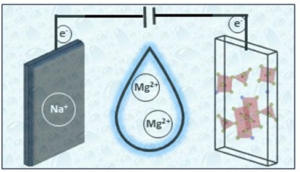
Daniela Söllinger, Julie Lam Chen, Jakub Zalesak, Jakob Praxmair, and Simone Pokrant. V3O7·H2O as a Cathode Material for Aqueous Mg2+/Na+ Hybrid Electrochemical Cells. ACS Omega, 2025. https://doi.org/10.1021/acsomega.4c08983
Stability and degradation of (oxy)nitride photocatalysts for solar water splitting
Advancing towards alternative technologies for the sustainable production of hydrogen is a necessity for the successful integration of this potentially green fuel in the future. Photocatalytic and photoelectrochemical water splitting are promising concepts in this context. Over the past decades, researchers have successfully explored several materials classes, such as oxides, nitrides, and oxynitrides, in their quest for suitable photocatalysts with a focus on reaching higher efficiencies. However, to pave the way towards practicability, understanding degradation processes and reaching stability is essential, a domain where research has been scarcer. This perspective aims at providing an overview on recent progress concerning stability and degradation with a focus on (oxy)nitride photocatalysts and at providing insights into the opportunities and challenges coming along with the investigation of degradation processes and the attempts to improve the stability of photocatalysts.
Valérie Werner, Franky Bedoya Lora, Ziwei Chai, Julian Hörndl, Jakob Praxmair, Sandra Luber, Sophia Haussener and Simone Pokrant, Stability and degradation of (oxy)nitridephotocatalysts for solar water splitting. RSC Sustainability, May 2024. https://doi.org/10.1039/D4SU00096J
Morphological design of LaTiO2N particles by topotactic growth mechanisms for photocatalytic applications

Valérie Werner, Gregor A. Zickler, Simone Pokrant*, Morphological design of LaTiO2N particles by topotactic growth mechanisms for photocatalytic applications. Progress in Solid State Chemistry 2024, Volume 73. https://doi.org/10.1016/j.progsolidstchem.2024.100442
Exploring the Insertion Mechanisms of Metal Cations into V3O7·H2O
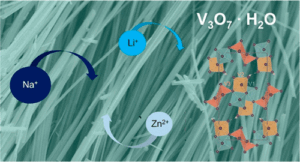
Daniela Söllinger, Jürgen Schoiber, Philipp L. Darge, Günther J. Redhammer, Simone Pokrant*, Exploring the Insertion Mechanisms of Metal Cations into V3O7·H2O. J. Phys. Chem. C 2024, 128, 5, 2255–2265. https://doi.org/10.1021/acs.jpcc.3c08056
Porous MCM-41 Silica Materials as Scaffolds for Silicon-based Lithium-ion Battery Anodes
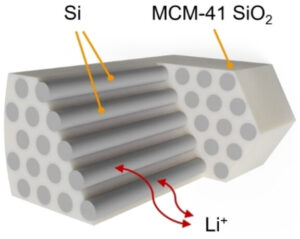
Karl, M., Kalyakina, A., Dräger, C., Haufe, S., & Pokrant, S. (2024). Porous MCM-41 Silica Materials as Scaffolds for Silicon-based Lithium-ion Battery Anodes. ChemElectroChem. https://doi.org/10.1002/celc.202300707
Device Characterization Methods
in-operando XRD Faraday efficiency measurement Set-up Measurement set-up for hydrogen and oxygen evolution rates
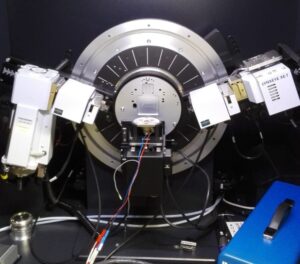
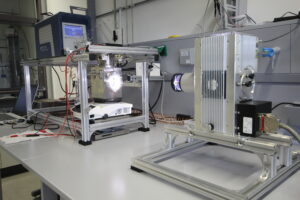
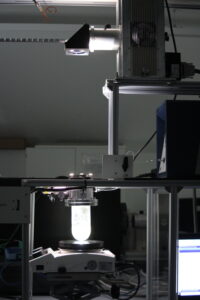
Infrastructure project BioMat TEM
The functional materials group is proud of being part of the project team BioMat-TEM. The aim of this project is the upgrade of the local transmission electron microscope with a cryo unit and an energy filter (1,9 MEu). It will enable subnanometer imaging and analysis of beam sensitive materials like energy materials or biomaterials.For more information, click here and here.
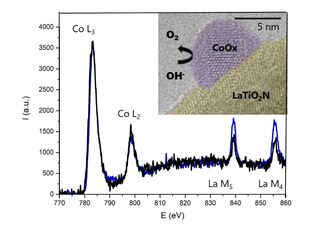
Showcases for research enabled by the energy filter/cryo upgrade
Oxidation state determination of CoOx cocatalyst nanoparticles with a size of 5-40 nm by core loss EELS. The cocatatalysts are deposited on the photocatalyst LaTiO2N (adapted from Pokrant S. et al., Materials Today Energy, 5, 2017, 158)
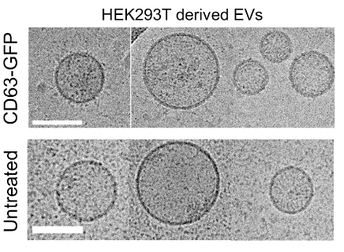
Cryo transmission electron micrograph of extracellular vesicles, scaling bar 100 nm (adapted from Corso G., Meisner-Kober N. et al., Journal of Extracellular Vesicles, 8, 2019, 1663043 )




